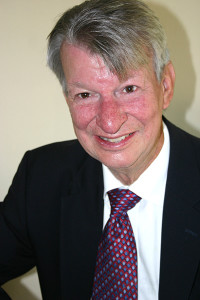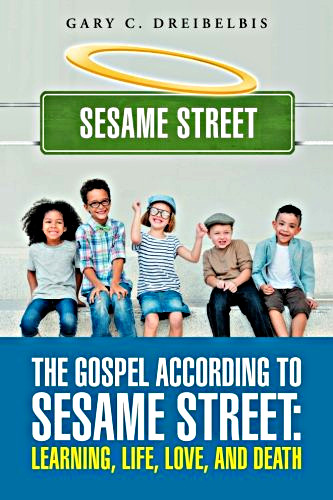The popularity of “Sesame Street” isn’t debatable. Still, when Bradley University’s former debate coach writes about the long-running program, one might expect persuasion, syllogistic reasoning, and rhetoric.
Instead, Gary Dreibelbis in the new “Gospel According to Sesame Street” focuses on its substance, essence and effect on society over the last 47 years.

SUPPLIED PHOTO Gary Dreibelbis
Dreibelbis, 63, was Bradley University’s forensics director in the 1980s – when the school’s speech team earned six national titles and never lost a national competition. Since then, Dreibelbis – who’s has taught at Northern Illinois University (NIU), the University of Georgia, and San Francisco Theological Seminary, and now teaches communications at Solano Community College in Suisun City, Calif. – has written books including “The Video Performer” and “Watching What We Watch: Prime Time Television through the Lens of Faith.”
Here, he revisits a beloved series with an eye toward lessons beyond numbers, letters and other pre-school subjects taught in commercial spots, songs, animation and games.
Organized in a Christian framework, the 150-page paperback is an interfaith primer. Instead of debating religion, this behind-the-scenes title shows how a treasured TV show has been a model for education, inclusion and faith.
Set in a short street in a city where children and furry puppet creatures coexist in a welcoming environment, “Sesame Street” has been successful and has improved. By 2006 it was “the most widely viewed children’s television show in the world,” according to a report by the U.S. State Department, with 20 versions globally and broadcasts in more than 120 countries. Two years later, it was estimated that 77 million Americans had watched the series as children.
Although focused on young viewers, Sesame Street has always been for all ages, which Dreibelbis noticed years ago when he taught at NIU, where college students watched in TV lounges.
Featuring many of Jim Henson’s familiar Muppets – Big Bird and Elmo, Cookie Monster and Oscar the Grouch, Bert and Ernie, Grover and Kermit the Frog, and all kinds of monsters, owls and other indescribable neighbors – it’s also featured visitors of all types. Celebrity guests have included not just Maya Angelou, Harvey Fierstein, Larry King and Ralph Nader, but Bill O’Reilly, Richard Pryor, Albert Pujols and the late actor Christopher Reeve, in his wheelchair.
That episode was one of many that demonstrated the program’s commitment to presenting everyday situations, which include disabilities and diversity across the spectrum. And although there have been people such as the bi-lingual Latina Rosita (played by Carmen Osbahr) and in an Asian version of the show the Afghan Muppet Zari (played by Mansoora Sherzad), the cast has always gone beyond a multi-racial cross-section of humanity. There were people with autism, allergies and other common conditions.
Of course, the show’s creators from its production company, Children’s Television Workshop, saw the series as a sort of video pre-school, especially for kids who couldn’t be in formal pre-school situations, but it evolved into much more. Dreibelbis shows that “Sesame Street” offered lessons for lifetimes.
On example was presented through the character of Snuffleupagus (“Snuffy”), a brownish-orange male elephant or wooly mammoth that appeared only to Big Bird – until 1985. In that season’s premiere episode, cast members who’d been skeptical of Snuffy’s existence finally were able to see him.
“The ‘Sesame Street’ experience is not unlike real-life experiences where people constantly doubt,” Dreibelbis writes, relating such disbeliefs to the New Testament’s “Doubting Thomas.”
“Maybe we should learn to listen to the Big Birds of our lives,” he continues, “because there might be some Snuffys out there waiting to be discovered.”
Besides its insights, achieved through analysis and interviews with executive director Joan Ganz Cooney and co-founder Lloyd Morrisett, the book presents the program as a sort of cultural touchstone generations have shared. Dreibelbis also effectively reminds readers of the importance of everyday people.
“Jesus did not always hang around with the most influential people or movers and shakers of the time,” Dreibelbis writes. “Jesus associated with tax collectors and prostitutes while also healing the sick.”
“Sesame Street” had an approach that seems “to epitomize the Golden Rule – and ‘It’s not Easy Being Green’,” he adds.
Also not easy is accepting – or explaining – loss, especially to youngsters. But “Sesame Street” did.
On Nov. 24, 1983 (Thanksgiving Day), the show addressed the 1982 death of actor Will Lee, who’d played Hooper, the Jewish store owner on Sesame Street. In one of the most memorable and effective segments, the program delicately taught its audience about death.
The episode has Big Bird preparing to give a present to Hooper, and he’s told he wasn’t there – that he’d died. But the yellow innocent is confused, so Susan explains, “Big Bird, when people die, they don’t come back.”
“Ever?” Big Bird asks.
“No, never,” Susan says.
“Well, why not?” Big Bird asks.
Olivia joins in to comfort Big Bird, saying, “We still have our memories of him.”
Big Bird begins to understand, saying, “We can remember him as much as we want to… But I don’t like it. It makes me sad,” adding, “Why does it have to be this way. Give me one good reason.”
Gordon says, “Just because.”
In the book, Dreibelbis writes, “Perhaps for people of faith, Gordon’s response to Big Bird, ‘because,’ is appropriate. If you start a sentence with ‘because,’ it is worth completing.”
Still broadcast on PBS – airing 9 a.m. Monday-Friday and 6 a.m. Sundays on WTVP-TV 47 – “Sesame Street” episodes are now run first on HBO, Dreibelsbis notes, writing, “ ‘Sesame Street’ is adapting to the changing viewing habits of children [with] its new slogan ‘Making kids smarter, stronger and kinder.’”

Former Bradley University debate coach Gary Dreibelbis has written “The Gospel According to Sesame Street.”
